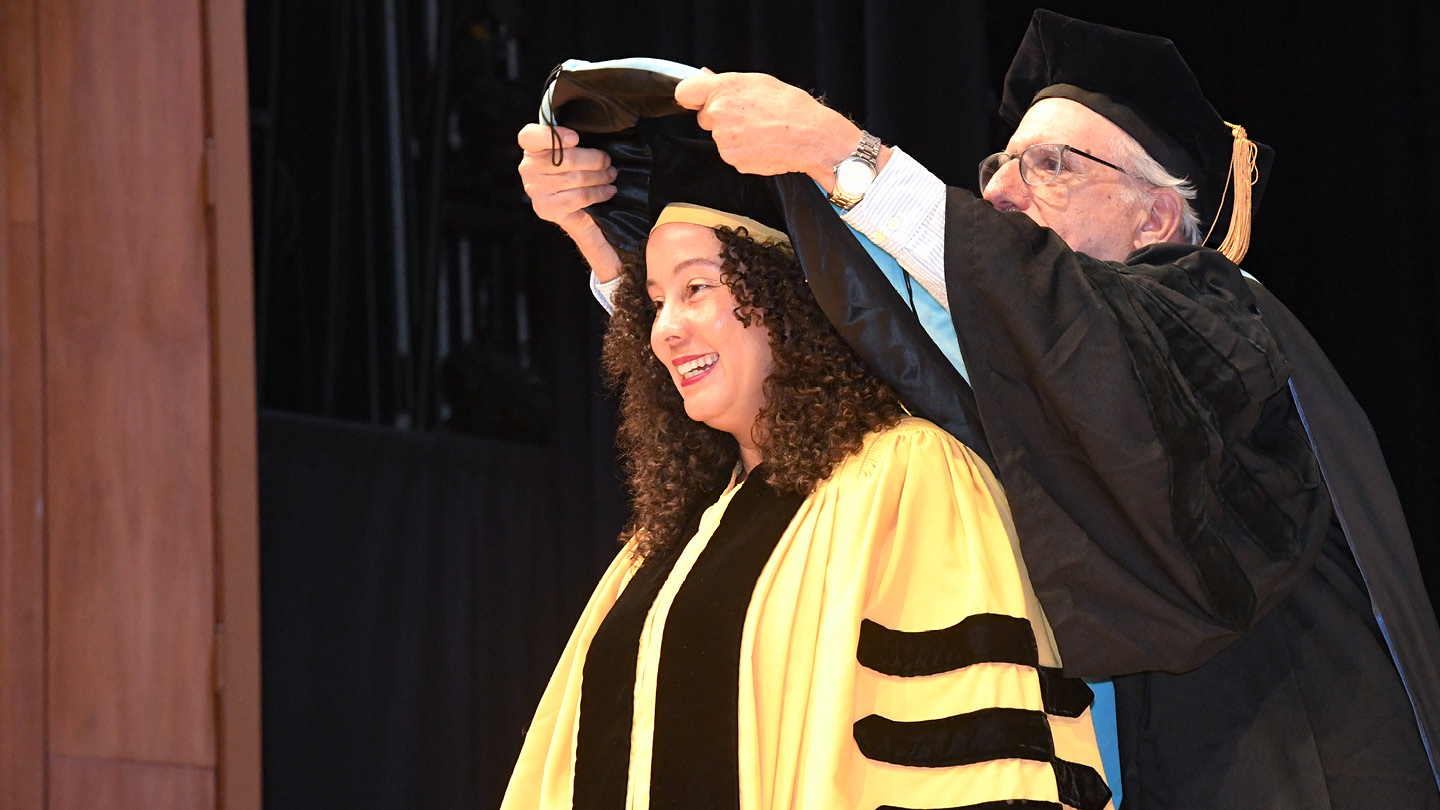Johns Hopkins’ newly redesigned, global online Doctor of Education is at the forefront of education doctoral programs with the most innovative, challenging, and student-centered program of its kind.
For more than a decade, Johns Hopkins has set the standard in doctoral education with its pioneering global online Doctor of Education (EdD) program. We are always innovating and refining the student journey to meet the changing landscape of education while remaining dedicated to a highly rigorous and deeply student-centered approach.
The vision of the Johns Hopkins EdD program is to prepare education-practitioners across the country and around the world to think critically about problems within their education environment and develop the insights and capacity to lead positive, sustained change.
Questions? Please reach out and we’ll be in touch soon.
Upcoming Admissions Events
Have questions about our degree programs, the application, or financial aid and costs? Join us for an inside look at a graduate experience defined by innovation and driven by evidence-based research. Learn more about your area of interest or career path, meet some of our faculty, and connect to the Johns Hopkins School of Education community. Check out our admissions events and register for a virtual information session today.
Core Faculty
-
Yolanda Abel, EdD
Associate Professor
Affiliation
Advanced Studies in Education
Expertise
Administration, Organization & Leadership, Education Policy & Politics, Social Context of Education

-
Camille Bryant, PhD
Associate Professor
Affiliation
Advanced Studies in Education

-
Joshua Travis Brown, PhD
Assistant Professor
Affiliation
Advanced Studies in Education
Expertise
Administration, Organization & Leadership, Education Policy & Politics, Postsecondary Education, Social Context of Education

-
Marcia Davis, PhD
Associate Professor (Research)
Co-Director, Center for Social Organization of Schools
Director of Research, Baltimore Education Research ConsortiumAffiliation
Center for Social Organization of Schools, SOE Leadership
Expertise
Learning & Instruction, Research, Evaluation & Assessment

Yolanda Abel, EdD
Associate Professor
Affiliation
Advanced Studies in Education
Expertise
Administration, Organization & Leadership, Education Policy & Politics, Social Context of Education

Camille Bryant, PhD
Associate Professor
Affiliation
Advanced Studies in Education

Joshua Travis Brown, PhD
Assistant Professor
Affiliation
Advanced Studies in Education
Expertise
Administration, Organization & Leadership, Education Policy & Politics, Postsecondary Education, Social Context of Education

Marcia Davis, PhD
Associate Professor (Research)
Co-Director, Center for Social Organization of Schools
Director of Research, Baltimore Education Research Consortium
Affiliation
Center for Social Organization of Schools, SOE Leadership
Expertise
Learning & Instruction, Research, Evaluation & Assessment

-
James Diamond, PhD
Assistant Professor
Program Director, Learning Design and TechnologyAffiliation
Counseling & Educational Studies
Expertise
Educational Technology, Learning & Instruction

-
Christine Eith, PhD
Department Chair, Advanced Studies in Education
Associate ProfessorAffiliation
Advanced Studies in Education

-
Keri M. Guilbault, EdD
Associate Professor
Affiliation
Counseling & Educational Studies
Expertise
Gifted Education, Learning & Instruction

-
Olivia Marcucci, PhD
Assistant Professor
Affiliation
Advanced Studies in Education, Center for Safe and Healthy Schools
Expertise
Social Context of Education

James Diamond, PhD
Assistant Professor
Program Director, Learning Design and Technology
Affiliation
Counseling & Educational Studies
Expertise
Educational Technology, Learning & Instruction

Christine Eith, PhD
Department Chair, Advanced Studies in Education
Associate Professor
Affiliation
Advanced Studies in Education

Keri M. Guilbault, EdD
Associate Professor
Affiliation
Counseling & Educational Studies
Expertise
Gifted Education, Learning & Instruction

Olivia Marcucci, PhD
Assistant Professor
Affiliation
Advanced Studies in Education, Center for Safe and Healthy Schools
Expertise
Social Context of Education

-
E. Juliana Pare-Blagoev, EdD
Associate Professor
Affiliation
Counseling & Educational Studies

-
Eric Rice, PhD
Assistant Professor
Program Director, Teacher Development ProgramsAffiliation
Counseling & Educational Studies
Expertise
Social Context of Education, Urban Education

-
Laura Flores Shaw, EdD
Assistant Professor
Affiliation
Advanced Studies in Education
Expertise
Learning & Instruction

-
Henry M. Smith, EdD
Assistant Professor
Affiliation
Advanced Studies in Education
Expertise
Administration, Organization & Leadership, Education Policy & Politics

E. Juliana Pare-Blagoev, EdD
Associate Professor
Affiliation
Counseling & Educational Studies

Eric Rice, PhD
Assistant Professor
Program Director, Teacher Development Programs
Affiliation
Counseling & Educational Studies
Expertise
Social Context of Education, Urban Education

Laura Flores Shaw, EdD
Assistant Professor
Affiliation
Advanced Studies in Education
Expertise
Learning & Instruction

Henry M. Smith, EdD
Assistant Professor
Affiliation
Advanced Studies in Education
Expertise
Administration, Organization & Leadership, Education Policy & Politics

Program Overview
Exceptional education-practitioners will engage with an internationally renowned faculty to cultivate and practice curiosity, critical discourse, and perspective taking in a unique and rigorous course of study using the lenses of social justice, systems thinking, appropriate research methods, and empirical inquiry.
Coursework includes the latest research on the social determinants of education; mind, brain, and teaching; entrepreneurship; data and measurement; and technology. The redesigned program allows our doctoral students to customize their program by expanding their choice of electives so that they may focus more deeply on their professional interests that align with their problem of practice. Our online EdD prepares education practitioners to be transformational leaders within their professional settings.
The vision of the Johns Hopkins EdD program is to impact complex educational problems across the globe by preparing education practitioners to think critically and systemically about problems within their professional settings and develop deep understanding and insights to lead positive, sustained change within those settings.Our graduates create new areas of research, promote distribution and utilization of research findings in professional practice, and contribute to wider public discourse and policy.
Areas of Interest
The EdD program includes areas of interest. Applicants can indicate one or more areas of interest they think are related to a problem of practice and would like to explore. Current areas of interest are:
- Entrepreneurial Leadership in Education
- Learning Design and Technology
- Neurodiversity and Neuroeducation
- Urban Leadership
*Courses and course sequences are subject to change.
Entrepreneurial Leadership in Education
Entrepreneurial Leadership in Education offers a unique opportunity for school and other educational organization leaders in both public and private educational environments. Students develop their knowledge, skills, and dispositions as they engage in leading efforts to build new venture opportunities in varied educational organizations. Through multidisciplinary lenses, educational leaders promote innovation in the paradigms, strategies, values and culture in school systems, social entrepreneurial ventures, and education companies. Each of the courses offers an opportunity to explore leadership theoretical frameworks, identify a Problem of Practice, and create a plan of action, through analysis and synthesis of presentations, readings, and discussion of the current state of multiple educational environments and the visions and challenges for the future.
Sample Courses:
- Entrepreneurship in Education
- Talent Management and Organizational Finance for Entrepreneurial Leaders
- Data Driven Decision Making
- Partnerships and Educational Organizations
- Leadership in Education Organizations
- Research on Effective Professional Development
Learning Design and Technology
The EdD program’s Learning Design and Technology (LDT) area of interest is designed to equip educational leaders and researchers with the advanced knowledge and skills necessary to critically engage with the rapidly evolving field of educational technology. This area of interest draws on the foundational elements of the school’s LDT program, focusing on the integration of learning sciences, human-centered design, and innovative assessment strategies to drive meaningful educational change. EdD students will explore the intersection of technology and pedagogy, exploring conceptual and empirical research and developing skills in designing, implementing, and evaluating digital learning environments. Through this area of interest, students will be prepared to lead initiatives that leverage technology to enhance learning outcomes, promote equity and inclusivity, and address the diverse needs of learners in various educational contexts. This area of interest is ideal for those looking to make a significant impact on educational practice and policy through the thoughtful application of educational technologies.
Sample Courses:
- Gaming and Simulations for Learning
- How People Learn
- Computational Thinking for K–12 Educators
- Maker Education: Cultivating Curiosity, Creativity, and Problem Solving in Theory and Practice
- Foundations and Applications of Learning Experience Design
- AI in Education
Neurodiversity and Neuroeducation
The Neurodiversity and Neuroeducation area of interest is designed for educators eager to explore research in cognitive science and neuroscience and its potential applications in education. Courses promote the integration of diverse disciplines that investigate human learning and development. This area of interest draws upon basic and applied research from cognitive science, psychology, brain sciences, neurology, neuroscience, and education. Educators develop the knowledge and skills to interpret basic and applied research and to apply relevant findings to educational practices and policies with a social justice lens. Courses in this area of interest focus on building expertise in learning sciences and cognitive diversity, preparing candidates for roles as informed educators, effective leaders, and skilled advocates for equity and excellence.
Sample Courses:
- Mind, Brain Science, and Learning
- Fundamentals of Cognitive Development
- Neurobiology of Learning Differences
- Twice Exceptional Learners
- Creativity in Education
- Social, Emotional, and Psychosocial Development of the Gifted
- Survey of Autism
- Introduction to Children and Youth With Exceptionalities
Urban Leadership
Cities are usually characterized by diverse populations with rich communities made up of many different races, classes, languages, and nationalities, and this dynamism is a chief strength of urban areas. However, urban schools typically serve populations characterized by high concentrations of poverty and therefore face difficult choices about how to allocate scarce resources. Urban Leadership is designed for educational professionals interested in exploring this dual nature of urban schools through a deep understanding of a Problem of Practice based in their unique context of professional practice. This area of interest prepares educational leaders to work in urban environments through a focus on topics such as building a strength-based understanding of the complexities of urban communities, engaging the latest research on urban educational programs, developing strategies for program improvement, and building partnerships with families, communities, and other organizations.
Sample Courses:
- Approaches to Urban Education
- Individuals in Urban Context
- Organizations and Institutions
- Partnerships and Community Organizing
- Power, Politics, and Policy in Education
- Leadership for School and Educational Organization Redesign
- Critical Theories of Race and Racism in Education
Scholarship Support Available
Funded through a generous gift from Bloomberg Philanthropies, the EdD Initiative Scholarship offers need-based scholarship support to Johns Hopkins EdD students for up to three years of study. Learn more.
After SOE
Graduates from our EdD program work in diverse areas, including executive roles in educational organizations and start-ups, leadership in K-12 school districts and systems, consultancy in specialized education fields, and more.
Careers
- Administrator
- Superintendent
- Instructional Designer
- Chief Learning Officer
100% Online
Continue your full-time career and apply what you learn in real time as you earn your degree 100% online.
Careers
- Administrator
- Superintendent
- Instructional Designer
- Chief Learning Officer
100% Online
Continue your full-time career and apply what you learn in real time as you earn your degree 100% online.
Legal Disclosure
State-Specific Information for Online Students
Students should be aware of additional state-specific information for online programs. Johns Hopkins University is a member of the Carnegie Project on the Education Doctorate, which is the knowledge forum on the EdD. It has a membership of over 100 schools of education in the U.S., Canada, and New Zealand working collaboratively to improve professional preparation in education at the highest level.

